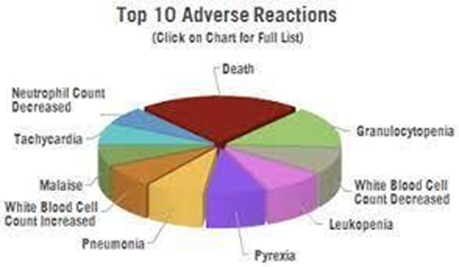The nurse should monitor which vital signs in the client who is taking Clozaril (Clozapine).
Blood Pressure
Respirations
Pain
Temperature
The Correct Answer is D
Choice A rationale: Clozapine has no effect on a patient’s blood pressure levels. However, blood pressure monitoring for all patients is crucial but the temperature is more relevant for a patient on clozapine.
Choice B rationale: Clozapine has no effect on an individual’s respiratory rate hence in this case it is not the priority vital sign to monitor.
Choice C rationale: Clozapine use does not cause pain. Furthermore, pain is not a vital sign.
Choice D rationale: One of the side effects of clozapine is agranulocytosis hence this predisposes the patient to infections which may manifest with fever. Therefore, it is important to monitor the patient’s temperature while on treatment.

Nursing Test Bank
Naxlex Comprehensive Predictor Exams
Related Questions
Correct Answer is D
Explanation
Choice A rationale: this may imply that the client is not cooperating and may make them feel guilty thus discouraging any further communication which may be useful in generating a treatment plan for the patient.
Choice B rationale: assuming that the client has completed her conversation is incorrect since it is an opportunity to explore the client’s feelings and thoughts that may be missed.
Choice C rationale: this is not the best action since it may interrupt the client’s natural process of reflection and expression while pressuring him/her to respond to the questions asked.
Choice D rationale: remaining silent and being attentive to the client’s nonverbal communication shows respect for the client’s pace and readiness to speak.
Furthermore, it demonstrates the nurse’s presence and their support.
Correct Answer is {"dropdown-group-1":"C"}
Explanation
Antipsychotics are used in the management of patients with psychotic disorders such as schizophrenia, schizoaffective disorder, and delusional disorder. They include drugs such as olanzapine, clozapine, quetiapine, and risperidone.
Whether you are a student looking to ace your exams or a practicing nurse seeking to enhance your expertise , our nursing education contents will empower you with the confidence and competence to make a difference in the lives of patients and become a respected leader in the healthcare field.
Visit Naxlex, invest in your future and unlock endless possibilities with our unparalleled nursing education contents today
Report Wrong Answer on the Current Question
Do you disagree with the answer? If yes, what is your expected answer? Explain.
Kindly be descriptive with the issue you are facing.
